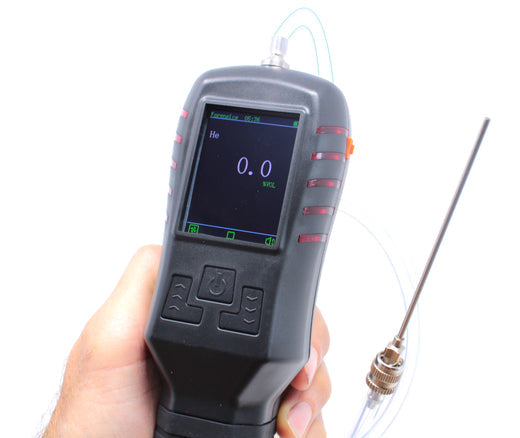Helium leak detectors are a crucial tool that are used in identifying and locating small leaks. These sophisticated instruments detect the presence of helium, an ideal gas for leak detection due to its small atomic size and rare presence in the ambient atmosphere. By introducing helium into or around a system and measuring its presence outside, helium leak detectors ensure the integrity and safety of systems where even minor leaks can have significant consequences. Widely used in industries such as aerospace, automotive, semiconductor manufacturing, welding, diving, rocket propulsion, cryogenics, MRI, processing, meteorology, and research & development, these detectors play a vital role in maintaining the proper functioning and reliability of critical equipment.
Pros |
Cons |
|
✅ Helium is special gas. It is light, small inert and a scarce gas ✅ Helium leak detectors are used to detect helium content in a gas mix or helium gas leak ✅ Helium leak detectors are useful for welding, rocket propulsion, cryogenics, MRI, meteorology and research and development |
⛔ Helium gas leak detectors vary in large price scale $100s to $10,000s (depending on sensitivity) ⛔ Critical to understand the application to ensure correct gas detector selection, range and lowest level of detection ⛔ Difficult gas to measure, requires use of specialized thermal conductivity sensors |
Best Helium Leak Detector Gas Analyzer?
Helium gas analyzers are used to analyze gas mixes for breathing, trimix scuba, compressed gas, industrial applications, welding, and research & development. Most helium gas analyzers detect from 0-100% helium content in air with a 0.1% resolution. A few reputable Helium Gas Analyzer options include:
-
Forensics Detectors Helium Leak Detector (Purity% and Leak): This detector is renowned for its high accuracy in detecting helium purity and identifying leaks in various applications. It is particularly useful in environments where maintaining precise helium purity is critical, as well as in pinpointing small leaks in complex systems.
-
Bacharach's He Helium Analyzer (Process Control): Designed for robust process control applications, this analyzer excels in continuously monitoring helium concentrations in industrial processes. Its durability and precision make it an ideal choice for long-term operations in challenging industrial environments.
-
Eaton Helium Gas Analyzer (Process Control): Eaton's analyzer is tailored for efficient process control, ensuring optimal helium gas levels in manufacturing and industrial settings. It features advanced sensor technology, offering reliable performance and quick response times in dynamic process control applications.
-
Nuvair's Pro He Alarm Analyzer (Breathing Gases, Diving): This device is a crucial tool for divers, providing accurate measurements of helium content in breathing gases. Its alarm feature enhances safety by alerting users to helium levels that may be unsafe for diving applications.
-
Divesoft Helium Analyzer (Breathing Gases, Diving): Divesoft's analyzer is specifically designed for the diving industry, offering precise helium measurements in mixed breathing gases. It is user-friendly and robust, making it a popular choice among professional and recreational divers alike.
-
Analox Helium Analyzer (Breathing Gases, Diving): This analyzer is highly regarded in the diving community for its accuracy in measuring helium concentrations in breathing gases. It is compact, easy to use, and provides divers with critical information for safe underwater exploration.
-
Analytical Instruments Helium Analyzer (Diving): Tailored for the diving industry, this analyzer helps divers monitor the helium content in their breathing gases. Its precision and reliability make it an essential tool for ensuring the safety and efficiency of diving operations.
What is the Best Helium Leak Detector?
These analyzers are used with a probe to detect helium leaks in various equipment, vacuum equipment, spectrometers and cryogenics. Since helium is light, it is a excellent tracer gas and can penetrate leaks or compromised seals to then be detected and ultimately find a leak. Some reputable options include:
- GL Sciences Helium Leak Detector
- Ion Science Helium Gas Leak Detector
- Infinicon Helium Leak Sniffers
- Nolek Helium Sniffer
- Forensics Detectors Helium Analyzer (Generic)

Is Helium Gas Critical to MRI scanners?
Yes. Helium is used to cool the superconducting magnets in a MRI scanner to a temperature below 4,15 Kelvin (-269°C). Since helium is a very small molecule, it can leak and hence, all seals and welds must be perfect in an MRI. A helium leak detector is imperative to be used in high magnetic fields such as those found around the outside of Magnetic Resonance Imaging (MRI) scanners.
How is Helium Gas Leaks Detected?
Since helium is an inert gas, chemical methods to detect He gas, such as redox reaction that are used in electrochemical and semiconducting metal oxide gas sensors do not work. Therefore, the change in thermal conductivity (since it is lower in molecular weight) compared to air, is an excellent physical method used to make a helium sensor. These sensors are called thermal conductivity detector (TCD), referred to sometimes as a katharometer. Two thermal element compared normal air with the gas sample. If the sample gas has an amount of "helium" the change in conductivity as a result of the physical thermal change will be detected and translated into a useful calibrated He concentration.

What is Helium Gas?
Helium is a gaseous compound that is colorless, odorless, and tasteless. It can be isolated from natural gas when the other compounds are liquefied at a low temperature and high pressure-- the helium remains as a gas. It finds uses in welding for other metals, in rocket propulsion, in meteorology, in cryogenics, and in high-pressure breathing operations.
Is Helium Gas Hazardous?
In general, helium gas is non-toxic and inert, decreasing its risk to humans. With that said, excessive inhalation of the gas can have asphyxiation effects due to the lack of oxygen.
Why is Helium Used in Trace Gas Leak Detection?
Using helium for trace gas leak detection has many advantages. Several are outlined below:
- Helium constitutes a relatively low concentration of gaseous compounds found in the air, meaning that there is not a high degree of background gas that can affect the reading
- Helium is inert and relatively stable
- Helium is non-toxic, non-flammable, non-explosive, and relatively safe for humans unless it is inhaled in a large quantity
How to undertake a Helium Leak Test?
There are several ways of undertaking a Helium Leak test using a Helium Gas Sniffer. Once method is called the “local-sniffer (sample under pressure)” method. In this case, the chamber of concern filled with helium and a helium gas leak detector is passed around the chamber, weld areas, connectors, seals, flanges and ducts for inspection and to see if any He is leaking. This “sniffed” gas is passed to a Helium sensor or mass spectrometer to record any elevated concentrations.

What is a Helium Mass Spectrometer Leak Detector?
The most expensive and most sensitive helium gas detectors function based on sector field mass spectrometry. Helium gets ionized in a vacuum where its ions are subsequently accelerated and separated in a magnetic field. The current generated from the ions is converted to electric current and that is what is displayed as the detection value. This is because the current generated is directly proportional to the concentration of helium.
What is a Helium Leak Detector?
A helium gas detector is a measurement device used to detect the presence of helium in the air. It is frequently referred to as a helium gas sniffer, helium gas analyzer or helium monitor. These are digital instruments that have been calibrated to a known supply and concentration of helium and present the user usually with %volume of helium gas in the air.
How to Select a Helium Leak Detector?
When selecting a helium gas detector the first question that should be asked is "What is the application". If the application is for diving, breathing gas, process control or determining the He gas concentration in air, most likely a generic Helium Gas Analyzer will be suitable. Then questions such as features, size, power and other functional attributes will be important. If on the other hand, one requires a He analyzer for gas leak detection, then one must focus their search on Helium Gas leak Detectors.
Who Uses a Helium Leak Detector?
Certain individuals in specialized industries may find a use for helium gas leak detectors. The largest "mainstream" market for helium analyzer is the diving and scuba market, where helium is part of a trimix breathing gas mix. Confirming the He gas concentration in the trimix is imperative.
Does Helium Leak Out of Tanks?
Helium tanks are often used to transport helium gas from one location to another. In these tanks, the helium should not leak out unless the valve has not been properly closed. As such, it is imperative to make sure to tighten the valve shut after using the helium.
What Are Some Common Methods for Helium Leak Testing a Vacuum System?
When helium leak testing in the presence of a vacuum system, there are two major methods used: integral testing and local testing.
Integral Testing
Integral testing takes place when the sample is under pressure/vacuum and is also in a vessel. The sample is either evacuated or placed into a vacuum, so it is sometimes referred to as a helium vacuum test.
Local Testing
Local testing takes place when the sample is under pressure/vacuum but is not in a vessel. The sniffed or pumped gas is passed to a mass spectrometer for a reading.
Is Helium Flammable?
No it is not. Helium is typically regarded as a fairly safe gas. In fact, it is frequently used to fill balloons at parties and events.
Can You Smell Helium Leak?
No, helium is an odorless, colorless, and tasteless noble gas. Detection requires specialized equipment like mass spectrometers or helium leak detectors for proper identification.
Final Words
Helium leak detectors, also known as helium gas leak detectors, helium gas sniffers, helium gas analyzers, or mass spectrometer leak detectors, play a crucial role in gas detection. These instruments are used to detect helium content in gas mixtures, gas flows, and often to identify helium gas leaks. For example, MRI scanners rely on helium to cool down their superconducting magnets, making helium leak detection essential for their proper functioning. Helium leak detectors find applications in various fields, including welding, rocket propulsion, cryogenics, meteorology, and research and development. By accurately detecting and locating helium leaks, these detectors ensure the safety, efficiency, and reliability of systems across diverse industries.
About the Author
Dr. Kos Galatsis ("Dr.Koz") is the President of FORENSICS DETECTORS, where the company operates from the scenic Palos Verdes Peninsula in Los Angeles, California. He is a subject matter expert on gas sensor technology, gas detectors, gas meters, and gas analyzers. He has been designing, building, manufacturing, and testing toxic gas detection systems for over 20 years.

Every day is a blessing for Dr. Koz. He loves to help customers solve their unique problems. Dr. Koz also loves spending time with his wife and his three children going to the beach, grilling burgers, and enjoying the outdoors.
Read more about Forensics Detectors here.
Email: drkoz@forensicsdetectors.com
Phone: +1 424-341-3886

